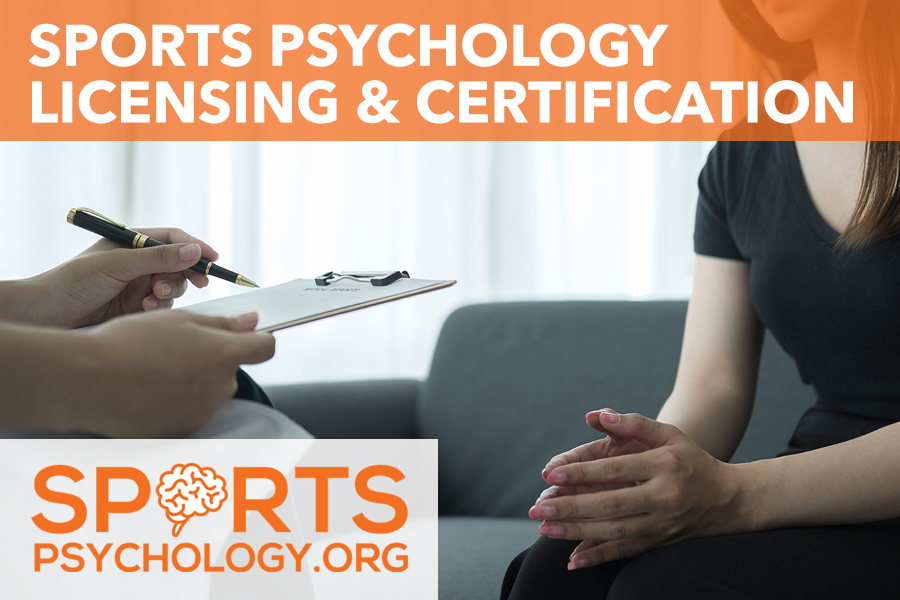Sports Psychology Licensing & Certification
In the field of sports psychology, obtaining licensure and certification is an important step towards establishing oneself as a qualified professional. Licensing ensures that practitioners meet specific standards and qualifications, while certification demonstrates specialized expertise and knowledge in the field. This article provides an overview of the licensing and certification options for individuals interested in pursuing a career in sports psychology.

Becoming Licensed as a Sports Psychologist
To become licensed as a sports psychologist, individuals typically need to fulfill certain requirements, which may vary by state. The common factors involved in the licensure process include:
- Education Levels: A Ph.D. in sports psychology or a doctorate in a related field is generally required for licensure as a sports psychologist. However, master’s degrees in sports psychology may also be acceptable in some cases. An advanced degree provides a comprehensive foundation in psychological theories, research methodologies, and clinical practices.
- Examinations: Licensure exams, such as the Examination for Professional Practice in Psychology (EPPP), are often required to assess a candidate’s knowledge of psychology principles, ethics, and the application of psychological techniques. The exam fees and specific content covered may vary, so it is essential to refer to the licensing board or regulatory body in the respective state for detailed information.
- State Regulations: Each state may have its own specific regulations regarding licensure as a sports psychologist. It is important to understand the requirements, such as supervised clinical experience or additional coursework, as well as any continuing education obligations to maintain licensure.
Sports Psychology Certification Options
In addition to licensure, sports psychologists can pursue certifications to further enhance their credentials and demonstrate specialized expertise in the field. Certification options in sports psychology include:
- Association for Applied Sport Psychology (AASP): AASP offers the Certified Mental Performance Consultant (CMPC) credential. To become certified, individuals typically need to hold a master’s or doctoral degree in psychology or a related field, complete a specific number of supervised practice hours, and pass a certification examination. Detailed information regarding eligibility requirements, examination content, and fees can be found on the AASP website.
- American Board of Sport Psychology (ABSP): ABSP provides the Board Certified in Sport Psychology (BCSP) credential. To achieve certification, individuals generally need to hold a doctoral degree in psychology or a related field, complete a certain number of supervised hours of practice, and pass a certification examination. More information about the certification process, requirements, and fees can be obtained from the ABSP website.
It is important to note that these are just two examples of certifying bodies in sports psychology, and there may be others available. Exploring each organization’s website and reviewing their specific requirements and procedures will provide a comprehensive understanding of the certification options available.
Obtaining licensure as a sports psychologist and pursuing certification through recognized organizations in the field can significantly enhance professional credentials and demonstrate a commitment to excellence in sports psychology. Individuals interested in pursuing a career in sports psychology should thoroughly research and understand the licensing and certification requirements of their specific state and the certifying bodies they wish to pursue.
Sports Psychology Certification Comparison
Not sure which sports psychology certification is right for you? Check out our comparison table below:
| Certified Mental Performance Consultant (CMPC) | Board Certified in Sports Psychology (BCSP) | |
|---|---|---|
| Credentialing Body | Association for Applied Sport Psychology (AASP) | American Board of Sport Psychology (ABSP) |
| Eligibility Requirements | Master’s or doctoral degree in sport psychology or related field, completion of supervised experience hours, passing the CMPC exam | Doctoral degree in clinical or counseling psychology with specialization in sport psychology, completion of supervised experience hours, passing the BCSP exam |
| Focus | Applied mental performance consulting in sports | Clinical assessment, treatment, and research in sports psychology |
| Scope of Practice | Enhancing mental skills, goal setting, performance optimization, athlete counseling | Diagnosis and treatment of mental health issues, performance enhancement, research |
| Professional Competencies | Sport psychology theory, mental skills training, ethical practice, cultural competence | Clinical psychology principles, assessment and diagnosis, treatment planning, research methodology |
| Certification Renewal | Continuing education and professional development requirements | Continuing education, clinical practice, and professional development requirements |
| Accreditation | No specific accreditation for CMPC | American Psychological Association (APA) accreditation for BCSP |
| Career Opportunities | Sports performance consulting, coaching, athletic programs, sports academies | Clinical sports psychology practice, research, academia, sports organizations |
| Recognition | Widely recognized in the field of sport psychology | Prestigious certification in clinical sports psychology |
It’s important to note that this table provides a general comparison, and it’s recommended to refer to the respective credentialing bodies for the most accurate and up-to-date information on each certification.
